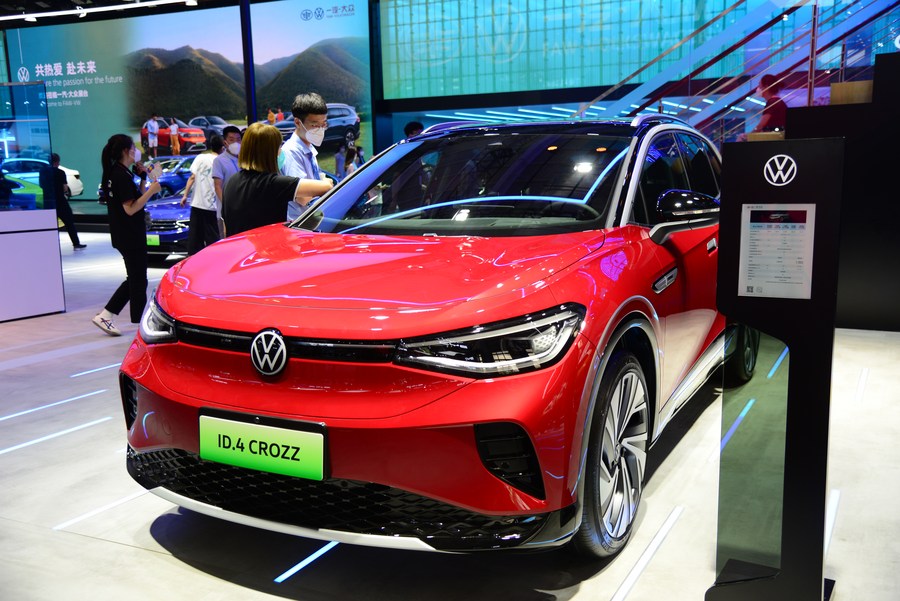Chinese manufacturers power strongly ahead with electric vehicle launches
By LI FUSHENG | CHINA DAILY | Updated: 2022-10-17 07:25

Herbert Diess, former chairman of Volkswagen, is fully aware that electric vehicles, or EVs, from local marques are more popular than those from foreign manufacturers in China, the German carmaker's largest market.
Speaking to his workers in June, one month before he was abruptly ousted from the world's second-largest car group after Toyota, Diess said: "Who of you here would spend 200 euros ($226) on a karaoke function? For many Chinese, it's standard — so we must deliver on that."
Volkswagen did not publicly confirm why Diess was suddenly removed, but one reason could be his hasty efforts to transform the car giant — which had long been accustomed to the glory days of the gasoline age — into a competent organization in the age of EVs.
A source close to Diess said the executive took decisions without overly considering his colleagues' feelings, as he wanted to get things done as quickly as possible.
The popularity of Chinese EV manufacturers is due to far more than the availability of karaoke functions in their models.
For example, the Aion Y Plus launched last month by local marque Aion offers ambient lighting that changes with the rhythm as occupants sing along to karaoke in the SUV.
The model features a projection screen and fully foldable front-row seats for passengers to rest their legs, enabling them to watch movies as comfortably as they do at home. They can even select the film they want to see from numerous choices by making hand gestures.
Facial recognition gauges the mood of the driver, and recommends music accordingly. It also alerts the driver if it finds he or she is tired.
Parking skills are no longer a concern, as the vehicle can park itself if the driver is within 6 meters of it.
On top of all this, the compact model is thousands of dollars cheaper than Volkswagen's ID. 4, whose infotainment and navigation functions are not that easy to use, according to the company's employees.
Xiao Yong, vice-president of Aion, expects monthly sales of the Aion Y Plus to exceed 20,000, roughly equivalent to total sales of three ID models produced by two Volkswagen joint ventures in China.
Functions similar to those in the Aion Y Plus are so commonplace in Chinese EVs that local customers take them for granted, which explains why they are flocking to domestic carmakers.
To date this year, only three international brands have made the list of the top 15 EV makers in China — Tesla and Volkswagen's two joint ventures.
Yale Zhang, managing director of consulting company Automotive Foresight, said, "Electric cars designed and built like gasoline cars are good in every respect, but excellent in none, and they will not sell."
Zhang said this is especially true in the Chinese market, where carmakers are competing to present models with futuristic features such as big screens, facial recognition and powerful computers.
He said this explains why Volkswagen's ID series are popular in Europe, but not in China. "European buyers are usually more traditional, and they have better brand loyalty. In China, consumers prize new technology when it comes to electric cars," Zhang said.
Many global carmakers view EVs as vehicles powered by a battery, and resembling their gasoline siblings as much as possible in terms of handling, which is also what customers demand in European countries.
But Chinese carmakers such as Aion define EVs as digital devices on wheels. They tend to emphasize the number of sensors that are used in a model, how smooth and natural the driver-vehicle dialogue is even when dialects are spoken, and just how easy it is for the vehicle to park itself in a confined space.
Such an approach has much to do with what customers want, and Chinese car buyers demand new features and also like to experience new technology.
In a study last year, Stanford University ranked China second for global artificial intelligence vibrancy, after the United States, while Germany ranked seventh, and Japan 13th.
Edward Wang, managing director of syndicated research at J.D. Power China, said Chinese carmakers better understand what tech-savvy local customers want, and they are much quicker to adopt new technologies, as they are open to fresh ideas.
In comparison, international carmakers' Chinese joint ventures usually have to follow a schedule set by their overseas headquarters, which means that when their latest models hit the market, they are not new in the eyes of Chinese buyers.
Volkswagen launched its first EV model in China last year, Honda's first EV reached the Chinese market in June, and Nissan's did so in September. Toyota followed suit on Oct 10.
Stephan Woellenstein, who left as CEO of Volkswagen China in July, said Europe set the benchmark in the era of gasoline-powered vehicles, but it can no longer do so in the age of EVs.
"China will lead the auto industry globally for the next 10 to 20 years. Volkswagen must be fully aware of this and deepen its localization efforts," he said.
























